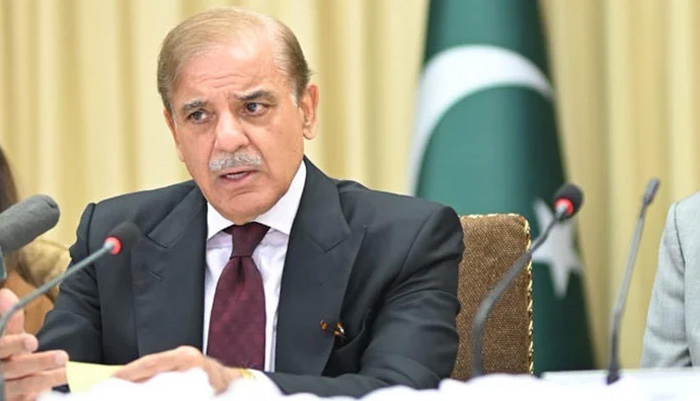'Peace non-negotiable': PM pledges zero-tolerance policy for terrorists
Prime Minister Shehbaz Sharif shares two key decisions made after hours-long delibrations in NSC meeting
Pakistan will adopt a zero-tolerance policy for terrorists challenging its writ, Prime Minister Shehbaz Sharif said on Tuesday while sharing the key decisions of the National Security Committee (NSC).
At its 40th meeting, the NSC resolved that Pakistan reserves all rights to safeguard its people. The meeting was headed by the premier in Islamabad on January 2.
On December 30, 2022, the forum vowed to respond firmly to resurgent terrorism in the country and declared militants as “enemies of Pakistan”.
At the latest NSC moot, the committee reiterated its resolve to have zero tolerance for terrorism in Pakistan and reaffirmed its determination to take on any and all entities that resort to violence.
Taking to Twitter, PM Shehbaz Sharif said that "peace is non-negotiable", as he pledged to adopt a zero-tolerance policy against outlaws as per NSC's decision.
He stated that the other key decision made at the NSC meeting was that an "economic roadmap will revive the economy & provide relief to the people".
Pakistan adopts ‘zero-tolerance’ policy against terrorists
On Monday, the NSC decided that no country will be allowed to provide sanctuaries and facilitation to terrorists.
“This [terrorism] will be dealt with the full force of the state. Pakistan’s security is uncompromisable and the full writ of the state will be maintained on every inch of the territory,” the committee decided as the nation of 220 million continue to deal with rising terrorism in the country.
The forum underscored that comprehensive national security revolves around economic security and that sovereignty or dignity comes under stress without self-sufficiency and economic independence.
The committee was also apprised of the security situation of the country with a particular focus on recent terrorist incidents in Khyber Pakhtunkhwa and Balochistan.
PM Shehbaz emphasised that the war against terrorism will be led by federal and provincial governments as per National Action Plan (NAP) in accordance with National Internal Security Policy (NISP) with people-centric socio-economic development as a priority while armed forces will provide resolute deterrence and a secure conducive and enabling environment.
Provincial apex committees are being revived in full earnest and law enforcement agencies especially Counter-Terrorism Departments (CTD) will be brought up to the required fighting standards with requisite capabilities.
Consensus on economic stability roadmap
The statement revealed that the forum undertook a comprehensive view of the ongoing economic situation keeping in view the challenges being faced by the common people of Pakistan, particularly the lower and middle-income classes.
Federal Minister for Finance and Revenue Ishaq Dar briefed the forum about the economic stability roadmap of the government including the status of discussions with international financial institutions, exploring other financial avenues based on mutual interests as well as relief measures for common people.
In order to strengthen the economy, the committee agreed on undertaking concrete steps including import rationalisation as well as preventing illegal currency outflows and hawala business.
“Emphasis will be specially made to improve agricultural output and manufacturing sector to ensure food security, import substitution and employment. It was resolved that people-centric economic policies with trickle-down effects to common people will remain a priority,” the statement read.
The forum also agreed to involve all stakeholders for consensus to realise effective and fast-track economic recovery and road map.
Flood rehabilitation
While taking into account the efforts for mitigating the challenges of 33 million flood affectees, the forum resolved to mobilise all resources for their rehabilitation and reconstruction in coordination with the provincial governments and multilateral financial institutions.
The 40th meeting was attended by relevant federal cabinet members, Chairman Joint Chiefs of Staff Committee General Sahir Shamshad Mirza, all services chiefs, and heads of intelligence services.
-
Security forces gun down 30 terrorists in multiple IBOs in KP: ISPR
-
MQM-P calls for new province in Sindh
-
US report validates Pakistan military edge over India: PM
-
Banned TTP poses serious threat to Pakistan security: UNSC panel
-
CM Afridi clarifies remarks on by-poll after ECP requests army deployment
-
Dubai sees 3.2m Pakistani passengers in 2025 as airport sets new milestone
-
Security forces kill 23 Indian proxy terrorists in KP's Kurram
-
Pakistan to construct island to boost oil exploration: report












